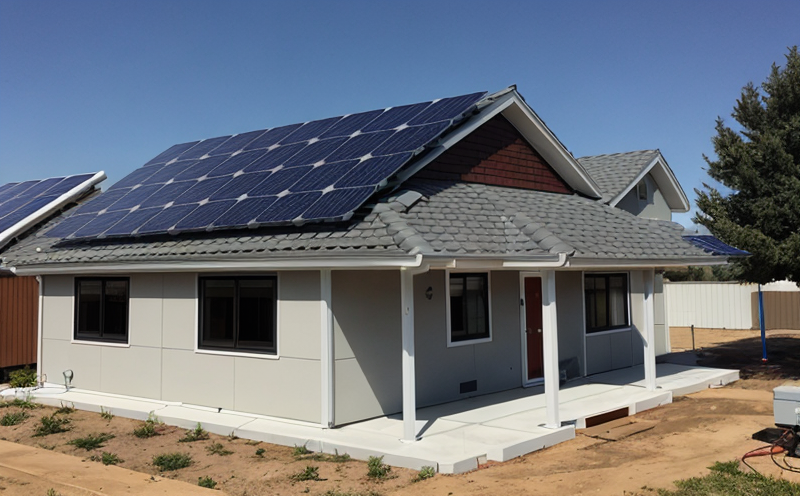
-
Renewable Energy Testing and Standards-
Advanced Solar Energy Certification and Testing-
Advanced Solar Panel Durability Testing and Certification
We provide comprehensive solutions designed to help our clients mitigate risks, enhance performance, and excel in key areas such as quality, health & safety, environmental sustainability, and social responsibility.
Discover
For many years, our organization has been operating successfully, boasting modern laboratories that meet international standards. These laboratories are equipped with the latest technology devices and equipment, and we have built a strong team of experienced and trained personnel to operate them.
DiscoverWelcome to Eurolab, your partner in pioneering solutions that encompass every facet of life. We are committed to delivering comprehensive Assurance, Testing, Inspection, and Certification services, empowering our global clientele with the ultimate confidence in their products and processes.
Discover
-
Renewable Energy Testing and Standards-
Advanced Solar Energy Certification and Testing-
Advanced Solar Panel Durability Testing and CertificationAdvanced Solar Panel Durability Testing and Certification
The solar industry has witnessed significant growth over the past decade, driven by decreasing costs, increasing efficiency, and government incentives. As the demand for renewable energy sources continues to rise, manufacturers are under pressure to produce high-quality solar panels that can withstand various environmental conditions. Advanced durability testing and certification have become essential in ensuring the reliability and performance of solar panels.
What is Durability Testing?
Durability testing involves simulating real-world conditions to assess a products ability to withstand wear and tear, corrosion, and other forms of degradation. In the context of solar panels, durability testing typically includes exposing the panels to extreme temperatures, humidity, UV radiation, and mechanical stress. The goal of durability testing is to evaluate a panels performance over its expected lifespan (typically 25 years or more).
Types of Durability Testing:
There are several types of durability testing used in the solar industry:
Accelerated Aging Tests: These tests involve subjecting solar panels to intense heat, humidity, and UV radiation to simulate the effects of aging over an extended period. The tests can be carried out using specialized equipment such as xenon arc testers or QUV (quantum ultraviolet) testers.
Mechanical Stress Testing: This involves applying mechanical stress to the panels frame, connections, and other components to evaluate its resistance to deformation and cracking.
Corrosion Resistance Testing: Solar panels are exposed to corrosive environments such as salt spray chambers or humidifiers to assess their ability to withstand corrosion.
Detailed Explanation of Accelerated Aging Tests:
Accelerated aging tests simulate the effects of weathering, aging, and degradation on solar panels over an extended period. These tests can be broadly categorized into two types:

Agricultural Equipment Certification
Agricultural equipment certification is a process that ensures agricultural machinery meets specific...

Environmental Impact Assessment
Environmental Impact Assessment: A Comprehensive Guide Environmental Impact Assessment (EIA) is a c...

Military Equipment Standards
Military Equipment Standards: Ensuring Effectiveness and Safety The use of military equipment is a ...

Construction and Engineering Compliance
Construction and Engineering Compliance: Ensuring Safety, Quality, and Regulatory Adherence In the ...

Lighting and Optical Device Testing
Lighting and Optical Device Testing: Ensuring Performance and Safety Lighting and optical devices a...

Healthcare and Medical Devices
The Evolution of Healthcare and Medical Devices: Trends, Innovations, and Challenges The healthcare...

Chemical Safety and Certification
Chemical safety and certification are critical in ensuring the safe management of products and proce...

Industrial Equipment Certification
Industrial equipment certification is a critical process that ensures industrial equipment meets spe...

MDR Testing and Compliance
MDR Testing and Compliance: A Comprehensive Guide The Medical Device Regulation (MDR) is a comprehe...

Transportation and Logistics Certification
Transportation and Logistics Certification: A Comprehensive Guide The transportation and logistics ...

Product and Retail Standards
Product and Retail Standards: Ensuring Quality and Safety for Consumers In todays competitive marke...

Food Safety and Testing
Food Safety and Testing: Ensuring the Quality of Our Food As consumers, we expect our food to be sa...

Hospitality and Tourism Certification
Hospitality and Tourism Certification: Unlocking Opportunities in the Industry The hospitality and ...

Electrical and Electromagnetic Testing
Electrical and Electromagnetic Testing: A Comprehensive Guide Introduction Electrical and electrom...

Battery Testing and Safety
Battery Testing and Safety: A Comprehensive Guide As technology continues to advance, battery-power...

Trade and Government Regulations
Trade and government regulations play a vital role in shaping the global economy. These regulations ...

Electromechanical Safety Certification
Electromechanical Safety Certification: Ensuring Compliance and Protecting Lives In todays intercon...

IT and Data Center Certification
IT and Data Center Certification: Understanding the Importance and Benefits The field of Informatio...

Environmental Simulation Testing
Environmental Simulation Testing: A Comprehensive Guide In todays world, where technology is rapidl...

Consumer Product Safety
Consumer Product Safety: Protecting Consumers from Harmful Products As a consumer, you have the rig...

Aviation and Aerospace Testing
Aviation and Aerospace Testing: Ensuring Safety and Efficiency The aviation and aerospace industr...

Renewable Energy Testing and Standards
Renewable Energy Testing and Standards: Ensuring a Sustainable Future The world is rapidly transiti...

Railway Industry Compliance
Railway Industry Compliance: Ensuring Safety and Efficiency The railway industry is a critical comp...

Automotive Compliance and Certification
Automotive Compliance and Certification: Ensuring Safety and Efficiency The automotive industry is ...

Energy and Sustainability Standards
In today’s rapidly evolving world, businesses face increasing pressure to meet global energy a...

Cosmetic Product Testing
The Complex World of Cosmetic Product Testing The cosmetics industry is a multi-billion-dollar ma...

NEBS and Telecommunication Standards
Network Equipment Building System (NEBS) and Telecommunication Standards The Network Equipment Bu...

Fire Safety and Prevention Standards
Fire Safety and Prevention Standards: Protecting Lives and Property Fire safety and prevention stan...

Pressure Vessels and Installations Testing
Pressure Vessels and Installations Testing Pressure vessels are a critical component of various ind...

Pharmaceutical Compliance
Pharmaceutical compliance refers to the adherence of pharmaceutical companies and organizations to l...